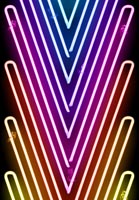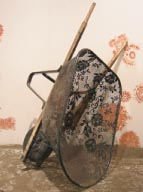Greg Foley of Visionaire, 6 Questions

Designer, author, and nascent director, Greg Foley seems blessed with a Midas touch, effortlessly undertaking new projects and working fluidly within several mediums. As the Creative Director of the quarterly conceptual magazine, Visionaire, since its inception in 1991 and as Design Director of its six-year-old offshoot, the bimonthly V Magazine, this native Texan has worked with everyone from Kidrobot (images after the jump) to The Pet Shop Boys (he's responsible for the Grammy-nominated cover design of their 2002 album, Release) and designed everything from jewelry to cell phone prototypes. On a recent Sunday, I chatted with the man-of-many-talents about his college band, how we're all children, and intellectual property. It's all part of our series on the speakers from the upcoming Semi-Permanent conference that we're cosponsoring, so catch him there if you can.
How did you get here?
When I was at RISD I was interested in fashion as a default. Any other major would be too limited or not appropriate. For I.D. you may as well go to engineering school. Aesthetically, you either have it or you don’t. Fashion seemed like this big unknown that was more about creative direction, a poetic thesis. By the time I graduated I had these big intellectual property questions.
I had interned with Stephen Gan when he was still at Details before it got bought. Just before I graduated Stephen called me and said, "I’m doing this little project thing and when you move to the city you've got to help out." This was pre-computers, we made it on a coffee table with paste-up boards and Xeroxes, and it snowballed into a publishing company.
Visionaire was loose-format, firstly, because it was meant to be free form. You could put it in whatever order you wanted, almost like a portfolio. Also, for cost-effectiveness, it was cobbled together from loose paper. Stephen had like 9,000 bucks and that's what he used to put it together.
There was this community of people he knew, different people who had different creative backgrounds. It was work that couldn’t be showcased anywhere else; it had a personal touch. That ethic goes all the way from editorial to production. For me personally, I wouldn’t be doing it if that weren’t the ethic of the thing – that each time it takes a different theme, etc. There’re still a few formats that are dreams.
What are you doing now?
I've been writing children's books. The first will come out next year. It's called, “Thank You Bear." It's a simple story. Designing an actual story with an actual character is sort of the best first step towards creating intellectual property. I’m interested in writing stories, doing character development. I've started directing. It comes from a similar skill set, but working with sound and movement editing.
Cecilia [Dean, Visionaire co-founder,] and I also teach this class with Donald Hearn at Parsons. It's called "The Visual Story" and I want to develop the syllabus into a textbook that we can try and find a university press to publish. What we've learned and developed over the years seems to be really great, almost like life lessons about design or about making design faster.
What are your current obsessions?
Anything that falls into my field of vision or that someone mentions. Because I work compulsively it's like anything that’s put in front of me I want to adjust or fix or change or tweak. I just got this great Joseph Franklin textile design book in Sweden. And this Agent X-9 comic book while I was in Sweden as well. Harold Budd just put out what supposed to be his last album. It may not be his best album, but it's interesting.
I’m interested in comedy. This friend of mine is a huge influence and has been a great guide in what I do. He was the guy who made me promise to make a video he said, "Just pick one and do it." He's this preeminent agent out in Hollywood and he introduced me to all these comedians.
What's next?
We just finished a two-volume collectors edition on 7L and produced by German publisher, Steidl. [see cover above right] It'll be the original giant format of V Magazine but in two books, combining the first five years of V Magazine.
I look forward to my fist gig directing something short. I've made a few test films and I have a growing list of visual exercises. Honestly, like anything, you just got to fall into a community, meet people and start talking with them, and see where the first gig happens.
I have a gang of other books, each with a separate character. I would like to have my own imprint one day. Aren’t we all children? It's something that I realized a long time ago and I guess maybe it was an inspiration. I was studying child cognitive development as a way to get my bearings [for a cartoon project] and I just realized there's some muddy ground between different societies' rituals for growing up and maturing. I mean these are ancient things that take thousands of years to develop. I realized if people would just realize we're kids and we're only here for an instant, then you might give yourself a break and be a little kinder to the kids around you.
I’m going to take a piano class. I'm totally excited. I took piano as a kid, but I couldn’t sit still for it. I like to pretend that I sing. You know, I never read as a kid. I cheated my way through. I was very visual, so you go back. I go to writing workshops. It just takes awhile. I did have a band in college founded by this savant guy, Dan. It was a totally awesome band. It was called, "The Lunch." I've tried to collaborate with people since. I think [them smoking] pot always got in the way.
What role do you see digital technology taking in the print world?
There’s a few ways we've done it so far. In the world issue that Gap cosponsored, we sent out the call for contributions via email and encouraged that people spread it via the Internet. It's the new world of Internet globalization. We used a lot more contributors in that issue than we ever had before. We edited from thousands and published a lot of unknown people's work. We also had the play issue, which was also a lot of digital image flipbooks and we're edging our way towards making actual moving content. Otherwise, maybe a digital screen and we’re also developing a sound issue – there’s so many ways that that can be done.
Any Advice?
You just go out and answer whatever questions you have. It's kind of that whole thing about how we are children. If you have a question, it deserves an answer. It takes so much of the edge off if you don't have to prove anything.
Whatever you do, teach if you can. You learn as much as you're teaching really. Honestly, you learn what you teach. One of the primary directives of our class is story. In the course description it says design without a story often becomes decoration. Style can become decoration. And through the many different mediums, if you have a solid story to communicate, you can avoid just kind of slapping decorative shit onto things.
I guess the question is: What is the story you're communicating? What can you hand over to the next person? You should be able to leave it half-finished and if someone else picks it up, they'll know what to do with it. Good work begins that way; you kind of ask a question and someone else answers.












